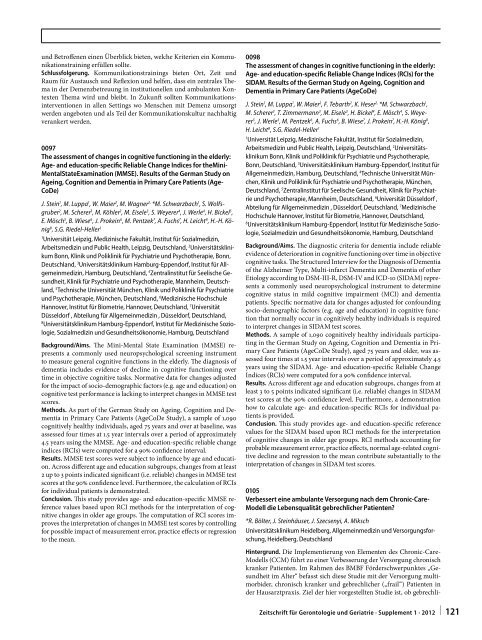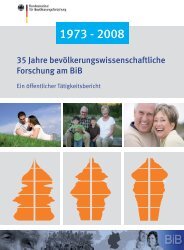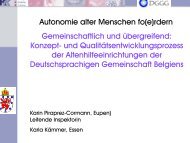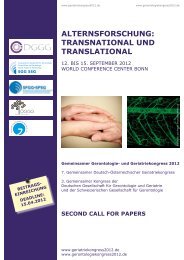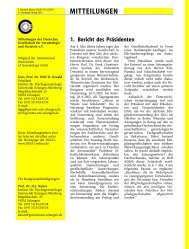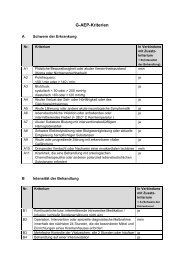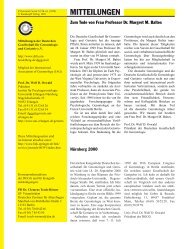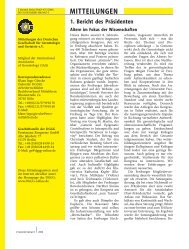Alternsforschung: Transnational und translational Gemeinsamer ...
Alternsforschung: Transnational und translational Gemeinsamer ...
Alternsforschung: Transnational und translational Gemeinsamer ...
Erfolgreiche ePaper selbst erstellen
Machen Sie aus Ihren PDF Publikationen ein blätterbares Flipbook mit unserer einzigartigen Google optimierten e-Paper Software.
<strong>und</strong> Betroffenen einen Überblick bieten, welche Kriterien ein Kommunikationstraining<br />
erfüllen sollte.<br />
Schlussfolgerung. Kommunikationstrainings bieten Ort, Zeit <strong>und</strong><br />
Raum für Austausch <strong>und</strong> Reflexion <strong>und</strong> helfen, dass ein zentrales Thema<br />
in der Demenzbetreuung in institutionellen <strong>und</strong> ambulanten Kontexten<br />
Thema wird <strong>und</strong> bleibt. In Zukunft sollten Kommunikationsinterventionen<br />
in allen Settings wo Menschen mit Demenz umsorgt<br />
werden angeboten <strong>und</strong> als Teil der Kommunikationskultur nachhaltig<br />
verankert werden.<br />
0097<br />
The assessment of changes in cognitive functioning in the elderly:<br />
Age- and education-specific Reliable Change Indices for theMini-<br />
MentalStateExamination (MMSE). Results of the German Study on<br />
Ageing, Cognition and Dementia in Primary Care Patients (Age-<br />
CoDe)<br />
J. Stein 1 , M. Luppa 1 , W. Maier 2 , M. Wagner 2, *M. Schwarzbach 1 , S. Wolfsgruber<br />
2 , M. Scherer 3 , M. Köhler 3 , M. Eisele 3 , S. Weyerer 4 , J. Werle 4 , H. Bickel 5 ,<br />
E. Mösch 5 , B. Wiese 6 , J. Prokein 6 , M. Pentzek 7 , A. Fuchs 7 , H. Leicht 8 , H.-H. König<br />
8 , S.G. Riedel-Heller 1<br />
1 Universität Leipzig, Medizinische Fakultät, Institut für Sozialmedizin,<br />
Arbeitsmedizin <strong>und</strong> Public Health, Leipzig, Deutschland, 2 Universitätsklinikum<br />
Bonn, Klinik <strong>und</strong> Poliklinik für Psychiatrie <strong>und</strong> Psychotherapie, Bonn,<br />
Deutschland, 3 Universitätsklinikum Hamburg-Eppendorf, Institut für Allgemeinmedizin,<br />
Hamburg, Deutschland, 4 Zentralinstitut für Seelische Ges<strong>und</strong>heit,<br />
Klinik für Psychiatrie <strong>und</strong> Psychotherapie, Mannheim, Deutschland,<br />
5 Technische Universität München, Klinik <strong>und</strong> Poliklinik für Psychiatrie<br />
<strong>und</strong> Psychotherapie, München, Deutschland, 6 Medizinische Hochschule<br />
Hannover, Institut für Biometrie, Hannover, Deutschland, 7 Universität<br />
Düsseldorf , Abteilung für Allgemeinmedizin , Düsseldorf, Deutschland,<br />
8 Universitätsklinikum Hamburg-Eppendorf, Institut für Medizinische Soziologie,<br />
Sozialmedizin <strong>und</strong> Ges<strong>und</strong>heitsökonomie, Hamburg, Deutschland<br />
Backgro<strong>und</strong>/Aims. The Mini-Mental State Examination (MMSE) represents<br />
a commonly used neuropsychological screening instrument<br />
to measure general cognitive functions in the elderly. The diagnosis of<br />
dementia includes evidence of decline in cognitive functioning over<br />
time in objective cognitive tasks. Normative data for changes adjusted<br />
for the impact of socio-demographic factors (e.g. age and education) on<br />
cognitive test performance is lacking to interpret changes in MMSE test<br />
scores.<br />
Methods. As part of the German Study on Ageing, Cognition and Dementia<br />
in Primary Care Patients (AgeCoDe Study), a sample of 1,090<br />
cognitively healthy individuals, aged 75 years and over at baseline, was<br />
assessed four times at 1.5 year intervals over a period of approximately<br />
4.5 years using the MMSE. Age- and education-specific reliable change<br />
indices (RCIs) were computed for a 90% confidence interval.<br />
Results. MMSE test scores were subject to influence by age and education.<br />
Across different age and education subgroups, changes from at least<br />
2 up to 3 points indicated significant (i.e. reliable) changes in MMSE test<br />
scores at the 90% confidence level. Furthermore, the calculation of RCIs<br />
for individual patients is demonstrated.<br />
Conclusion. This study provides age- and education-specific MMSE reference<br />
values based upon RCI methods for the interpretation of cognitive<br />
changes in older age groups. The computation of RCI scores improves<br />
the interpretation of changes in MMSE test scores by controlling<br />
for possible impact of measurement error, practice effects or regression<br />
to the mean.<br />
0098<br />
The assessment of changes in cognitive functioning in the elderly:<br />
Age- and education-specific Reliable Change Indices (RCIs) for the<br />
SIDAM. Results of the German Study on Ageing, Cognition and<br />
Dementia in Primary Care Patients (AgeCoDe)<br />
J. Stein 1 , M. Luppa 1 , W. Maier 2 , F. Tebarth 2 , K. Heser 2, *M. Schwarzbach 1 ,<br />
M. Scherer 3 , T. Zimmermann 3 , M. Eisele 3 , H. Bickel 4 , E. Mösch 4 , S. Weyerer<br />
5 , J. Werle 5 , M. Pentzek 6 , A. Fuchs 6 , B. Wiese 7 , J. Prokein 7 , H.-H. König 8 ,<br />
H. Leicht 8 , S.G. Riedel-Heller 1<br />
1 Universität Leipzig, Medizinische Fakultät, Institut für Sozialmedizin,<br />
Arbeitsmedizin <strong>und</strong> Public Health, Leipzig, Deutschland, 2 Universitätsklinikum<br />
Bonn, Klinik <strong>und</strong> Poliklinik für Psychiatrie <strong>und</strong> Psychotherapie,<br />
Bonn, Deutschland, 3 Universitätsklinikum Hamburg-Eppendorf, Institut für<br />
Allgemeinmedizin, Hamburg, Deutschland, 4 Technische Universität München,<br />
Klinik <strong>und</strong> Poliklinik für Psychiatrie <strong>und</strong> Psychotherapie, München,<br />
Deutschland, 5 Zentralinstitut für Seelische Ges<strong>und</strong>heit, Klinik für Psychiatrie<br />
<strong>und</strong> Psychotherapie, Mannheim, Deutschland, 6 Universität Düsseldorf ,<br />
Abteilung für Allgemeinmedizin , Düsseldorf, Deutschland, 7 Medizinische<br />
Hochschule Hannover, Institut für Biometrie, Hannover, Deutschland,<br />
8 Universitätsklinikum Hamburg-Eppendorf, Institut für Medizinische Soziologie,<br />
Sozialmedizin <strong>und</strong> Ges<strong>und</strong>heitsökonomie, Hamburg, Deutschland<br />
Backgro<strong>und</strong>/Aims. The diagnostic criteria for dementia include reliable<br />
evidence of deterioration in cognitive functioning over time in objective<br />
cognitive tasks. The Structured Interview for the Diagnosis of Dementia<br />
of the Alzheimer Type, Multi-infarct Dementia and Dementia of other<br />
Etiology according to DSM-III-R, DSM-IV and ICD-10 (SIDAM) represents<br />
a commonly used neuropsychological instrument to determine<br />
cognitive status in mild cognitive impairment (MCI) and dementia<br />
patients. Specific normative data for changes adjusted for confo<strong>und</strong>ing<br />
socio-demographic factors (e.g. age and education) in cognitive function<br />
that normally occur in cognitively healthy individuals is required<br />
to interpret changes in SIDAM test scores.<br />
Methods. A sample of 1,090 cognitively healthy individuals participating<br />
in the German Study on Ageing, Cognition and Dementia in Primary<br />
Care Patients (AgeCoDe Study), aged 75 years and older, was assessed<br />
four times at 1.5 year intervals over a period of approximately 4.5<br />
years using the SIDAM. Age- and education-specific Reliable Change<br />
Indices (RCIs) were computed for a 90% confidence interval.<br />
Results. Across different age and education subgroups, changes from at<br />
least 3 to 5 points indicated significant (i.e. reliable) changes in SIDAM<br />
test scores at the 90% confidence level. Furthermore, a demonstration<br />
how to calculate age- and education-specific RCIs for individual patients<br />
is provided.<br />
Conclusion. This study provides age- and education-specific reference<br />
values for the SIDAM based upon RCI methods for the interpretation<br />
of cognitive changes in older age groups. RCI methods accounting for<br />
probable measurement error, practice effects, normal age-related cognitive<br />
decline and regression to the mean contribute substantially to the<br />
interpretation of changes in SIDAM test scores.<br />
0105<br />
Verbessert eine ambulante Versorgung nach dem Chronic-Care-<br />
Modell die Lebensqualität gebrechlicher Patienten?<br />
*R. Bölter, J. Steinhäuser, J. Szecsenyi, A. Miksch<br />
Universitätsklinikum Heidelberg, Allgemeinmedizin <strong>und</strong> Versorgungsforschung,<br />
Heidelberg, Deutschland<br />
Hintergr<strong>und</strong>. Die Implementierung von Elementen des Chronic-Care-<br />
Modells (CCM) führt zu einer Verbesserung der Versorgung chronisch<br />
kranker Patienten. Im Rahmen des BMBF Förderschwerpunktes „Ges<strong>und</strong>heit<br />
im Alter“ befasst sich diese Studie mit der Versorgung multimorbider,<br />
chronisch kranker <strong>und</strong> gebrechlicher („frail“) Patienten in<br />
der Hausarztpraxis. Ziel der hier vorgestellten Studie ist, ob gebrechli-<br />
Zeitschrift für Gerontologie <strong>und</strong> Geriatrie · Supplement 1 · 2012 |<br />
121


